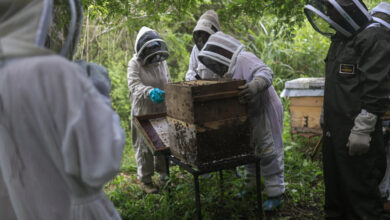Facts About the COVID-19 Vaccine for Pregnant and Lactating Women
COVID-19 vaccines have been shown to be highly effective during pregnancy.

The Woman Post | Nereida Vega
Listen to this article
Some current data on the safety of vaccines available against COVID-19 in pregnant people are limited. However, one of the most comprehensive reports on vaccination during pregnancy reinforces evidence that it is safe, although more thorough research is needed, advocated by a group of researchers.
In the United States, the Centers for Disease Control and Prevention (CDC) and the Food and Drug Administration (FDA) has implemented safety monitoring systems to gather information about vaccination during pregnancy. Preliminary results are based on reports of more than 35,000 pregnant Americans age 16 to 54 who received The Modern or Pfizer injections. The results of the report have been published in the New England Journal of Medicine, and have shown that miscarriage rates, preterm births, and other complications were comparable to those seen in published reports of pregnant women prior to the pandemic.
In this regard, the registration inscribed 3,958 participants with vaccination between 14 December 2020 and 28 February 2021. Among the 827 participants who had a full pregnancy, 712 ended up in a live birth (86.1%), 104 in a miscarriage (12.6%) 1 in stillbirth (0.1%). The conclusion of the report indicates that there are no safety issues among pregnant people who received the COVID-19 mRNA vaccines.
“The risk of death is 70% higher in pregnant women.
The US, UK & Belgium have prioritized them for vaccination.
But Indian women are not yet permitted to get the Covid-19 vaccine because govt has cited “lack of data” for vaccinating them.”
Shame!https://t.co/kLwkiqimxW
— Saket Gokhale (@SaketGokhale) May 23, 2021
Pregnant Women Transfer Protection From the COVID-19 Vaccine
Recent research shows that pregnant women and recent nursing mothers have a strong immune response to the COVID-19 vaccines and that they can transfer that immunity to their babies. The study included 131 women of reproductive age (84 were pregnant, 31 gave breasts, and 16 were not pregnant) who received one of two mRNA vaccines: Pfizer or Moderna.
Also read: HOW HAS THE PANDEMIC AFFECTED BIRTH RATES?
A group of Massachusetts researchers found that the antibodies generated by the vaccines were found in all umbilical cord blood and breast milk samples taken from the women in the study, showing that the antibodies pass from mothers to babies. They also found that antibody levels in the mucosa (IgA) were higher after the second dose of the Moderna vaccine, compared to the second dose of Pfizer. The study is the largest of its kind to date and was published on March 25 by the American Journal of Obstetrics and Gynecology.
Risk of COVID-19 Infection During Pregnancy
At the beginning of pregnancy, the virus is not associated with a higher likelihood of miscarriage. Vertical transmission, in which the virus passes from the mother's uterus to the baby, is relatively rare. And babies rarely get sick. In general, pregnant women tend to have milder symptoms than the population. However, they still have an increased risk of complications, including placental inflammation, and can become seriously ill.
In this line, vaccination would avoid these results. However, women are generally not included in early vaccine trials if they are pregnant. It is precisely now that data specifically related to the response to the vaccine of pregnant and lactating women are emerging. The work published in this article is the first study to address this topic, which makes it incredibly valuable.
COVID-19 Vaccine Side Effects
The American College of Obstetricians and Gynecologists (ACOG) published on December 13, 2020, a study called "Vaccination of Pregnant and Nursing Patients against COVID-19," which states that expected side effects should be explained as part of patient counseling, including that they are a normal part of the body's reaction to the vaccine and the development of antibodies to protect against COVID-19 disease. Most study participants experienced mild side effects similar to the symptoms of a flu-like disease after vaccination, such as injection site reactions (84.1%), fatigue (62.9%), chills (31.9%), muscle pain (38.3%), joint pain (23.6%) and headaches (55.1%). In the subgroup of study of people from 18 to 55 years, fever occurred above 38oC at 3.7% after the first dose and 15.8% after the second dose, according to the Food and Drug Administration (FDA).
Organized Webinars for COVID-19 Vaccination in Pregnant and Nursing Women
The International Federation of Gynecology and Obstetrics (FIGO) believes that there are minimal, real, or theoretical risks that would outweigh the potential benefits of vaccination for pregnant women. Therefore, they support the offer of COVID-19 vaccines to pregnant and breastfeeding women. In this webinar, the main speakers outlined FIGO's position on COVID-19 vaccination and also explored the need for counseling skills for gynecologists to ensure that women can make informed decisions. With a risk-based approach to the benefits of universal protection, the expert speakers discuss the safety, efficacy, and indications of the various vaccines for pregnant and nursing women.
Join me! Give women and girls their lives back❤️You can help raise money for FIGO (International Federation of Gynecology and Obstetrics) by donating online #JustGiving https://t.co/llfwRWTYsM
— Jeanne Conry, MD (@ConryJeanne) May 23, 2021




